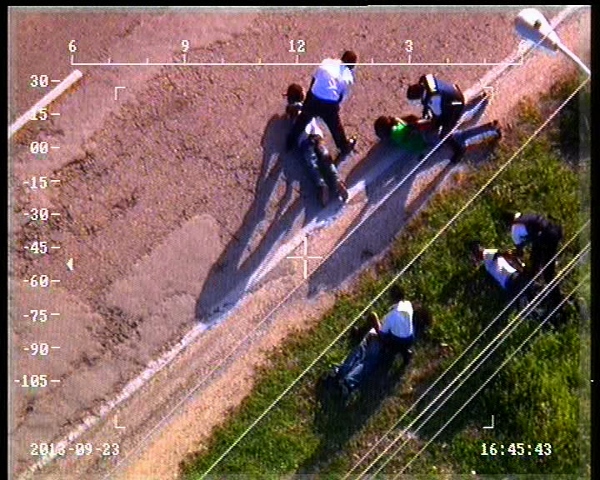Archive for September 23rd, 2013

North Side shop robbed, chopper secures arrest
 (CNS) Updated with image: Four men are in custody this evening following their arrest a short time ago in connection with a robbery at Chisholm’s Supermarket in North Side at around 4:25pm today, Monday 23 September. The suspects were arrested relatively quickly as a result of direct support from the RCIPS helicopter, which tracked the getaway car. Police said they received a report that two men, both in possession of what appeared to be handguns, entered the supermarket, where they threatened a female member of staff before making off with a quantity of cash and cigarettes. A grey hatchback car was seen to leave the premises travelling at speed following the hold-up at the district’s main grocery store.
(CNS) Updated with image: Four men are in custody this evening following their arrest a short time ago in connection with a robbery at Chisholm’s Supermarket in North Side at around 4:25pm today, Monday 23 September. The suspects were arrested relatively quickly as a result of direct support from the RCIPS helicopter, which tracked the getaway car. Police said they received a report that two men, both in possession of what appeared to be handguns, entered the supermarket, where they threatened a female member of staff before making off with a quantity of cash and cigarettes. A grey hatchback car was seen to leave the premises travelling at speed following the hold-up at the district’s main grocery store.
No one was injured and no shots were fired during the incident, the RCIPS stated, but other sources said a woman had fainted at the scene.
Following the robbers' departure from the crime scene in the grey car, uniform staff, armed officers and the police helicopter were immediately dispatched. The crew on board the chopper quickly spotted the grey hatchback driving on Frank Sound Road and then left towards East End.
 The crew maintained observations while continually updating mobile units. The car stopped for a very short time and some property was thrown into the bush before it continued at speed towards East End. On the arrival of the mobile units, the suspect vehicle stopped in Sea View Road near the junction of High Rock Road. All four male occupants were arrested on suspicion of robbery at around 4:45pm.
The crew maintained observations while continually updating mobile units. The car stopped for a very short time and some property was thrown into the bush before it continued at speed towards East End. On the arrival of the mobile units, the suspect vehicle stopped in Sea View Road near the junction of High Rock Road. All four male occupants were arrested on suspicion of robbery at around 4:45pm.
Anyone who was in the area and has any information regarding the robbery should contact Bodden Town police station on 947-2220, the RCIPS tip-line 949-7777 or Crime Stoppers 800-8477 (TIPS).

Barnes gets life for 2nd rape

Barnes was convicted of this offence in April following a trial by jury but he had already pleaded guilty to another rape of a 49-year-old woman, whom he had abducted from a bus stop. Both offences took place within a few days of each other in October 2011.
In the case presided over by Justice Quin, Barnes had denied raping the woman, who testified that he had repeatedly raped her after breaking into her home in the middle of the night armed with a Swiss army knife.
The details of the case were harrowing. The victim testified that she woke up in the middle of the night in her dark apartment to find a man on top of her with one hand on her throat and a knife. As she begged him not to rape her, he squeezed her throat tighter and told her to stop crying as it could be a lot worse — it could be six men. Barnes was said to have begun kissing the woman and told her to act like she was enjoying it before he cut off the clothes she was wearing with the knife.
After the rape, he even laid down and starting asking questions about her life, at which point she told him that the thing she feared most of all was to be raped. He responded by raping her more, including anal rape, even though she pleaded with him not to hurt her anymore.
At some point Barnes spotted the woman’s phone in the bed, which she had been using to text friends before she fell asleep. When he saw that she had seen it, he pushed the knife between her vagina and anus and threatened to “cut the whole thing out” if she tried anything. The nightmare lasted all night before Barnes told her he would come back with a gun if she told anyone. He said there was no point in telling the police anything because the RCIPS could not solve crimes.
In the light of dawn the woman told Barnes she had to go to work and she was eventually able to get away from him. She then immediately called a friend in Jamaica as she went to work, where she told her boss. After staying at her employer’s home that evening, she left the country the next day and never returned to her apartment. According to the evidence, the victim did not know Barnes but she had seen him around the neighbourhood and was able to identify him as a result of his tattoos and markings.
After she left Cayman, her employer went to the victim’s apartment and found the carnage and persuaded her to report the crime. He called the police who sent in a crime scene team. They found the cut clothes, a condom wrapper and Barnes’ DNA.
The victim reported being seriously impacted by the incident and said she can no longer be alone and still has nightmares. She wakes up in the night repeatedly to check windows and doors and is perpetually over cautious. According to her impact statement, she cannot speak about the crime and could not work for a year.
“I feel my personal space was totally violated and I have trouble communicating with others … The trial was very hard as I am ashamed of what happened, I came to Cayman to find a better life; instead, it is ruined,” she said.
Barnes was arrested later that month but not until he had raped another woman, whom he abducted from a bus stop on Shamrock Road. He took the 49-year-old woman to Admiral’s Landing in Red Bay, where in a deserted spot he raped her before driving off and leaving her at the location.
As a result of the description that the woman gave, a manhunt was triggered for Barnes. He reluctantly pleaded guilty to that offence but then attempted to withdraw his plea when he changed attorneys, but that application was denied and he was sentenced by Justice Henderson to fifteen years.
In the case before Justice Quin, Barnes was charged with two counts of rape and aggravated burglary and, because of his long criminal record, including 19 violent offences, the complete absence of any mitigating circumstances due to Barnes’ refusal to admit his guilt even after conviction, and a catalogue of aggravating circumstances relating to the horrific rape, the judge said that Barnes was a serious danger to women and that he would impose the maximum life sentence as provided for in the local sentencing guidelines for a second offence for rape.
After the sentence was handed down, Barnes asked to speak and insisted he was innocent.
“I listened to what was said about how I have violent tendencies, and everything I do I take responsibility for. But I promise you I did not commit this offence,” he said. The judge told him that the members of the jury were unanimous in their verdict, and although Barnes tried to argue that he was a victim of media bias, the judge cut him short, pointing out that he had delivered his ruling.
A social enquiry report on Barnes revealed that he believed the police had planted evidence, but experts described Barnes as a chronic offender with a long history of crime against people, irrespective of gender or status. The social enquiry report said he had a stable family life until he was ten, when his parents divorced and he began demonstrating behavioural problems and got involved with gangs drugs, guns and women. His first encounter with the law was when he was only 13.
Barnes gradually became responsible for off-loading illegally imported drugs from canoes, and when he was caught, he was went to Bonaventure and later an approved school in the United States, which he described as harder than prison.
He has 19 convictions, 12 of which are for violence, and while in prison the last time for rape, as he was convicted in 2001 and was given a ten year sentence, Barnes committed numerous infractions and acts of violence against prison officers.
Described as irritable, hostile and aggressive and viewing himself as an outcast, he scored high on the social enquiry report for paranoia and described himself as misunderstood, mistreated and persecuted. Diagnosed with possible hyper mania and depression, with many anti-social tendencies, a psychiatrist said he needed medication as he could have adult attention deficit disorder or a bi-polar condition.
As well as a life sentence for all three of thecounts against him, Justice Quin ordered Barnes to complete the prison’s anger management and sexual offenders’ treatment programme.
John Furniss, who represented Barnes, queried the possibility of a tariff when the life sentence was handed down, but Cheryll Richards, QC, the director of public prosecutions who brought the case for the crown, pointed out that thelegislative framework was not yet in place
The judge confirmed that it would be a matter for Furniss and his client to bring a case for review to the court.

Minutes reveal issues over civil service survey
 (CNS): Although problems were not spelt out in the minutes of the 26 August chief officers meeting, more work is needed on a survey of the civil service designed to take the pulse of public sector workers after cuts and austerity measures. The minutes, released by the deputy governor’s office, show that thechief officers discussed the pros and cons of two sample surveys and have identified a need for further research, which will be under taken by Acting CO Ian Fenton. He has also been tasked with refining the objectives in consultation with Deputy Governor Franz Manderson to ensure that the results of the opinion survey will be useful.
(CNS): Although problems were not spelt out in the minutes of the 26 August chief officers meeting, more work is needed on a survey of the civil service designed to take the pulse of public sector workers after cuts and austerity measures. The minutes, released by the deputy governor’s office, show that thechief officers discussed the pros and cons of two sample surveys and have identified a need for further research, which will be under taken by Acting CO Ian Fenton. He has also been tasked with refining the objectives in consultation with Deputy Governor Franz Manderson to ensure that the results of the opinion survey will be useful.
The minutes also record that civil service management needs to look at promotional possibilities to ensure maximum participation in the survey, which will be used to create new policy and deal with the need for further operational cost reductions. A chief officers sub-committee has been established to provide outcomes of the research and detailed feedback to the deputy governor and agree the next steps towards implementation.
The external examination results for Year 12 show significant improvements in the passes gained, the ministes record. 61% achieved 5 or more high level passes (A-C or I-III) compared to 49% last year.
In addition, Manderson thanked chief financial officers as government entities submitted their respective financial statements for the 2012/13 financial year on time for the third year in a row.
However, while they all made the deadline again, Auditor General Alastair Swarbrick, speaking at the Public Accounts Committee meeting last week, made it clear that the quality of the submissions was still very poor, describing some as “abysmal”.

Judge notes growing challenges in criminal cases
 (CNS): A Cayman Islands Grand Court judge has raised a number of issues faced by criminal courts in small jurisdictions with juries and witness protection. Speaking at a joint symposium of the Judicial Education Institute of the Eastern Caribbean Supreme Court and the Organisation of Eastern Caribbean State Bar Association, Justice Charles Quin said that with the rise of violent crime, balancing the rights of defendants was more difficult for small jurisdictions like Cayman than larger countries as they try to address problems of scared witnesses and jury selection. Justice Quin explored developments in criminal practice, such as judge alone trials and the controversial Witness Anonymity Order.
(CNS): A Cayman Islands Grand Court judge has raised a number of issues faced by criminal courts in small jurisdictions with juries and witness protection. Speaking at a joint symposium of the Judicial Education Institute of the Eastern Caribbean Supreme Court and the Organisation of Eastern Caribbean State Bar Association, Justice Charles Quin said that with the rise of violent crime, balancing the rights of defendants was more difficult for small jurisdictions like Cayman than larger countries as they try to address problems of scared witnesses and jury selection. Justice Quin explored developments in criminal practice, such as judge alone trials and the controversial Witness Anonymity Order.
With growing pressure for solutions to violent crime in Britain, the House of Lords delivered a landmark ruling in 2008 that declared that the use of anonymous evidence was not in all circumstances incompatible with the European Conventions of Human Rights. This ledto the introduction of a law allowing people to testify against a defendant without their identity being revealed to the defence.
Justice Quin said Cayman, like the UK, opted to abolish the common law right that a defendant in criminal proceedings can confront his accusers directly and introduced Witness Anonymity Orders. The orders are a practical alternative to the difficulties presented to the Cayman legal system of a witness protection scheme but they have raised controversies. Devon Anglin was recently convicted of the nightclub slaying of Carlos Webster based on two anonymous witnesses who gave evidence via a voice altered video link, where the witnesses were in silhouette.
However, Justice Quin emphasised the need for caution and pointed out that a judge who allows an anonymity order should not be the trial judge in that case. "An anonymity order should be regarded as a special measure of last practicable recourse,” he said, echoing the comments of the Lord Chief Justice of England & Wales.
He stressed the importance of a judge being careful about how an anonymity order would affect adefendant’s right to a fair trial and to give clear directions to juries where an anonymous witness has given evidence.
“The defendant's ability to advance his case and to undermine that of the prosecution is rendered unequal in some respects,” he warned. “There is also the possibility that a jury upon being instructed that a witness is to give evidence anonymously may assume that the defendant is of bad and dangerous character. The trial judge must give a strong direction to ensure that the jury does not make any assumptions adverse to the defendant or favourable to the anonymous witness,” he said.
Justice Quin spoke about judge alone trials and pointed out that several countries in the region had abandoned the right to trial by jury. But although Cayman had the option of judge alone trials, it was always an election by the defendant. He said trial by jury was the “jewel in the crown” or “the cornerstone of justice” and movements away all stemmed from the 1973 Northern Ireland Emergency Provision Act arising from the civil unrest and the potential impact on juror intimidation.
Justice Quin said that in 2003 England & Wales for the first time provided for trial on indictment without a jury in two different sets of circumstances – fraud trials and jury tampering. The provision relating to fraud trials was never used and was later repealed. In Cayman, however, it is the defendants who often elect a judge alone trial at the 11th hour when they see who is on the jury that has been selected to try them because the community is so small.
“Although The Criminal Procedure Code (of Cayman) states that the defendant should give at least 21 days’ notice, what frequently occurs is that the defendant comes into court, he has a studious review of the jury panel, you then see him enter into deep discussion with his attorney and an application is then made for a judge alone trial,” the judge said.
“What happens in the Cayman Islands is, I am sure, very likely to happen in all smaller islands and smaller communities; the defendant sees one or more people on the jury panel who he did not expect to see and who he did not want to see. The court is faced with a late application, but I have always found to be fair to the defendant is the overriding consideration and consequently I have never refused an application for a judge alone trial,” Justice Quin added.
See Justice Quin's presentation below.

Carjack suspect charged with list of offences
(CNS): The 23-year-old man arrested in connection with a gunpoint carjacking in George Town last week has been charged with driving whilst disqualified, driving without insurance, dangerous driving, taking and driving away a vehicle without the owner’s consent and threats to kill. Matthew Whittaker is expected in court today accused of being the man who stole a Honda Civic at gunpoint at around 6pm on Tuesday, 17 September, near the Red Cross buildingin Huldah Avenue. A police patrol gave chase after receiving the report of the carjack but the road chase was halted and the RCIPS helicopter tracked the car to Midland Acres, where the suspect was arrested.
Police explained that the car had been travelling at speeds of up to 80mph along Shamrock Road, weaving in and out of traffic, and so, in line with the RCIPS pursuit policy and concerns about public safety, the critical incident manager took the decision to stand down the road pursuit and instead use the Air Support Unit.
The helicopter crew was able to maintain visual contact on the car as it continued into the Midland Acres area, where it swerved off the road. The suspect ran into a nearby yard and bushes but the helicopter crew guided Uniformed Support Group (USG) officers to the suspect’s hiding place, when he was arrested on suspicion of possession of an unlicensed firearm.
It is not yet clear why no charges have been brought regarding possession of a firearm, as Whittaker was alleged to have had a handgun, which he reportedly used to threaten the owner of the car before taking the vehicle. Enquiries have been made with the RCIPS and CNS is awaiting comment.

New school costs defended by ministry
 (CNS): Although the cost of building and running the Clifton Hunter High School has been one of the biggest political footballs for more than five years, the deputy chief officer in the education ministry defended the project last week. Christen Suckoo said the jury may still be out on value for money but the school was a category five building that was already being widely used by the community, aside from being a state-of-the-art high school. Including legal costs, changes, repair work and the internal fit out, Suckoo said the final figure for Clifton Hunter was around $110 million. However, the annual running costs for the school compared well with the John Gray campus, despite having far more sophisticated facilities.
(CNS): Although the cost of building and running the Clifton Hunter High School has been one of the biggest political footballs for more than five years, the deputy chief officer in the education ministry defended the project last week. Christen Suckoo said the jury may still be out on value for money but the school was a category five building that was already being widely used by the community, aside from being a state-of-the-art high school. Including legal costs, changes, repair work and the internal fit out, Suckoo said the final figure for Clifton Hunter was around $110 million. However, the annual running costs for the school compared well with the John Gray campus, despite having far more sophisticated facilities.
Suckoo told the new Public Accounts Committee last week that lessons had been learned. He said there was no doubt that a proper business case for the schools should have been made and that, as government had been warned, the original pre-tender price given by Tom Jones International (TJI) of around $58 million was way too low, which was where the problems started.
The job had stalled for several months when the general contractor, sub-contractors and government all got into a legal battle after TJI walked off the site, and afterwards a considerable amount of repair work had to be done. This was then followed by design changes ordered by the education minister at the time, Rolston Anglin, who did not like the concept of mixed and open learning included in the original design. As a result, more walls were added inside the building to create traditional classrooms.
But despite the increase in the anticipated cost of the building, Suckoo said that the annual operating costs were around $2.6 million, including all contractual services. That compared very well to the more than $2.2 million it costs to run the old John Gray school site, which has no playing fields. He said the ministry was pleasantly surprised at the efficiencies in the building, which are keeping costs down.
Suckoo said several sporting events are taking place at the school and numerous requests have been made to use the fields, including one from the cricket association, which wants to use the pitch, given the problems at the Smith Road field. The deputy chief officer pointed to an international volleyball tournament held there recently and said the sporting facilities would help with sports tourism. He said the preforming arts centre was also in demand by the community.
He admitted that teachers had recently complained about the design as they had found there wasn’t enough shelf space, among other issues which were being addressed.
Suckoo also told the committee that the part-finished John Gray site was in a water-tight stage and preserved, awaiting a future construction re-start whenever the ministry is the given nod.

Suspect killer in HR fight
 (CNS): A West Bay man accused of murder, who has been on remand for over a year, has challenged his incarceration as unconstitutional. Local attorney Nick Hoffman, who is representing Brian Borden, is arguing that the bail law, which removes the presumptive entitlement to bail for a number of offences, is a basic breach of the fundamental human right to freedom and that Borden should be allowed to argue his case for bail on the circumstances of his case and not on the basis of the charge. Although remand in murder cases is not mandatory, it has for years been treated as such and it is exceptionally rare, with no recordsproduced in the hearing where a defendant facing a murder rap was released on bail.
(CNS): A West Bay man accused of murder, who has been on remand for over a year, has challenged his incarceration as unconstitutional. Local attorney Nick Hoffman, who is representing Brian Borden, is arguing that the bail law, which removes the presumptive entitlement to bail for a number of offences, is a basic breach of the fundamental human right to freedom and that Borden should be allowed to argue his case for bail on the circumstances of his case and not on the basis of the charge. Although remand in murder cases is not mandatory, it has for years been treated as such and it is exceptionally rare, with no recordsproduced in the hearing where a defendant facing a murder rap was released on bail.
Borden is accused of shooting Robert Mackford Bush in a gangster killing in West Bay in September 2011. However, the evidence against the West Bay man is understood to be relatively limited and based mostly on the testimony of one key witness who has been convicted of a gun related crime and who remains a controversial crown witness in other major cases as well.
Borden, who has been in jail for 13 months, was charged almost a year after the crime, which triggered a spate of targeted tit-for-tat gangster violence that lasted a week in which another four young men were shot dead and a fourth seriously wounded.
Hoffman argued Friday before Chief Justice Anthony Smellie that because entitlement to bail had been removed for certain offences, the burden of proof, which should lie with the crown to demonstrate one of a list of legitimate grounds for refusing bail, was removed. As the law elevates the actual crime as a ground for refusing bail, this makes the argument against remand very difficult, leading to an almost automatic jailing for murder and undermining the fundamental principle of the presumption of innocence for any defendant.
In Borden’s case the circumstances are even more of a human rights concern because his trial has been postponed due to issues relating to the crown’s case. As a result, Borden will be incarcerated for seventeen months before he will have an opportunity to make his case against the charges.
However, representing government and the attorney general, Solicitor General Jacqueline Wilson argued that the there was nothing unconstitutional about the law. She said the burden had not been removed from the crown and, as with all bail applications, those from defendants facing murder charges would be argued in the same way based on the grounds for retaining someone on remand. These would be the main reasons accepted universally in democracies, such as the flight risk, interference with witnesses, potential to re-offend and the length of sentence, which in the case of murder is mandatory life.
Hoffman pressed the point, however, that Cayman’s law elevated the charge itself to a reason, which is not universally accepted, to bar someone who was presumed innocent until convicted the entitlement to liberty without a proper hearing.
In most remand hearings for murder the crown barely has to raise any argument at all to be certain of remanding the defendant, and Hoffman said that this could not be compatible with either Cayman’s Bill of Rights or the European Convention on Human Rights, to which the country is a signatory.
Hoffman is now awaiting a declaration from the chief justice that the bail law is incompatible with the Bill of Rights, but even if he wins Borden is unlikely to be automatically released and he will still need to argue at a bail hearing that there is no risk to the community by his client being released until his trial.
If Hoffman wins the case, it could see a surge of new bail applications from a number of remand prisoners who are facing very serious charges and who remained incarcerated at HMP Northward's high security unit.

Mac in PAC attack
 (CNS): The opposition leader took aim at Auditor General Alastair Swarbrick during last week’s Public Accounts Committee hearing, telling the committee he was not prepared to take Swarbrick's findings at face value. McKeeva Bush, the UDP leader, said PAC needed to call more witnesses to get to the truth of the auditor general’s claims, many of which are directly linked to the UDP’s time in office. Bush also raised objections to closed door meetings to approve payments to the auditor and asked to see more evidence of what the office had done. During the two day meeting members scrutinized three reports from Swarbrick’s office that pointed to inappropriate board and political interference, and Bush questioned the right of the office to “besmirch” people without given them a chance to defend themselves.
(CNS): The opposition leader took aim at Auditor General Alastair Swarbrick during last week’s Public Accounts Committee hearing, telling the committee he was not prepared to take Swarbrick's findings at face value. McKeeva Bush, the UDP leader, said PAC needed to call more witnesses to get to the truth of the auditor general’s claims, many of which are directly linked to the UDP’s time in office. Bush also raised objections to closed door meetings to approve payments to the auditor and asked to see more evidence of what the office had done. During the two day meeting members scrutinized three reports from Swarbrick’s office that pointed to inappropriate board and political interference, and Bush questioned the right of the office to “besmirch” people without given them a chance to defend themselves.
PAC was examining three reports by the Office of the Auditor General (OAG) that had raised concerns about inappropriate board and political interference at several statutory authorities.
In turn, Bush raised his concerns that board members, particularly at the airport, had been criticised and claimed the auditor was not always right as he did not do his research properly. The opposition leader said that directors were often serving as volunteers but unfounded allegations were made against them and they were not given a chance to defend themselves.
He slammed the OAG for not interviewing all the people involved before issuing reports that point the finger and criticise.
“If youlook at the reports, the people are going to think there is no control when there is,” Bush said after questioning witnesses about the air ambulance services. However, he stressed that the PAC needed to have someone from the boards present when they addressed the OAG’s reports on statutory authorities and government companies.
“We have human rights in this country and this committee cannot do its work and clear the air on matters when people are not interviewed and only one side is given by the audit office,” he said.
He said the auditor wrote things about people without finding out the facts. “We can’t continue in a democratic country not adhering to human rights and writing something about somebody without given them chance to give their side of the story,” he said.
It was not clear why the PAC had not called any of the board members, and the team from Cayman Airways was the only group of witnesses from a statutory authority or government company that came with the board chair.
Bush, who has in the past referred to the auditor general as "a hit man", was on the attack through much of the hearings and said PAC was supposed to manage the audit office and it could not be allowed to carry on as it had. “You need to understand you can’t run ramshackle over everybody,” he told the team from the OAG.
Swarbrick defended his work, however, and pointed out that the PAC had oversight of the office but anything more would be political interference in the work of his office, which is meant to be an independent watchdog on public spending. He said the office followed best practice when compiling the reports and everyone was given a chance to submit comments on the reports.
Bush continued his criticism off the office and said the PAC needed to find the factual basis for Swarbrick’s findings and so needed the board members because the civil servants and authority employees could not answer all the questions, and he demanded proof of the allegations made in the reports.
Shouting at the new PAC chair, Roy McTaggart, Bush told him that while he may take the findings of the Office of the Auditor General (OAG) at face value, he (Bush) was not prepared to take everything Swarbrick said "as Bible”.
“People’s names have been besmirched and I want to see proof,” he said, accusing the auditor of making assumptions and that the good governance and transparency everyone wanted was one sided.
“Why must I come here and agree to this?” he demanded.

Man denies charges in smash that killed brother
 (CNS): A 26-year-old man charged with causing the death of his younger brother by dangerous driving pleaded not guilty during the Grand Court proceedings on Friday. Eduardo Robinson was the driver of the vehicle that crashed into a wall in the Prospect area in October last year with Egbert Robinson as a passenger. Meanwhile, after sustaining head injuries in a failed burglary attempt in Savannah, Harrison McLean Jr also appeared before Justice Charles Quin and pleaded not guilty to a single count of burglary. McLean was chopped in the head with a machete when he broke into the home and was confronted by the owner.
(CNS): A 26-year-old man charged with causing the death of his younger brother by dangerous driving pleaded not guilty during the Grand Court proceedings on Friday. Eduardo Robinson was the driver of the vehicle that crashed into a wall in the Prospect area in October last year with Egbert Robinson as a passenger. Meanwhile, after sustaining head injuries in a failed burglary attempt in Savannah, Harrison McLean Jr also appeared before Justice Charles Quin and pleaded not guilty to a single count of burglary. McLean was chopped in the head with a machete when he broke into the home and was confronted by the owner.
The court also heard Friday in the regular mentions list from Marlon Dillon, a key crown witness in a major trial. Dillon, who is a defendant as well as a witness in the trial, made his first appearance in court on robbery related charges via video link. His attorney put the court on notice that an abuse of process application was being made on Tuesday, when the defendant returns to court to be arraigned on charges in connection with a robbery at the local TV company, WestStar.
Garry Hurlston (41), charged with the attempted murder of Wesley Clarke, who has remained in a coma since June last year, continued to express his concern with legal aid lawyers and insisted on representing himself with the assistance of an attorney. Hurlston told the judge that his appearances in court have been a "waste of time" and made claims that he was wrongfully arrested. However, after many weeks of issues relating to the defendant’s case, Justice Quin interjected and said, "You've had countless lawyers; your actions have caused these delays."
The judge followed the order made by the presiding judge in Hurlston's case that the partially heard trial is to continue as expected on the 21 October, regardless of his representation status.
Justice Quin also heard a Cayman Brac woman plead her innocence to an attempted murder charge. Katie Joe Powell made her first appearance in Grand Court for a count of attempted murder and wounding with intent in April of this year.